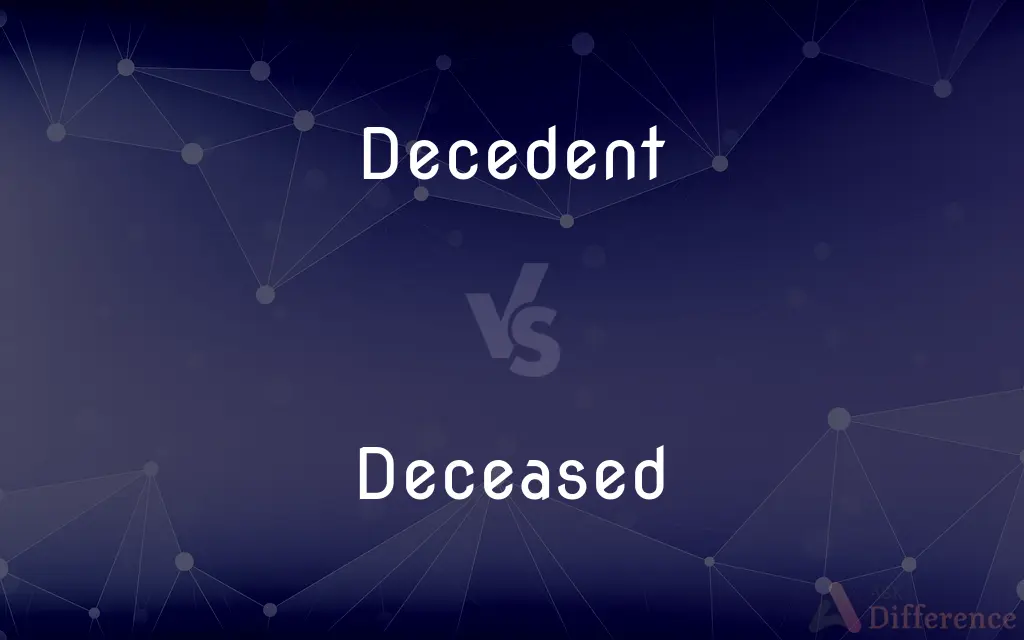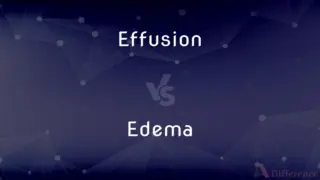Decedent vs. Deceased — What's the Difference?
By Fiza Rafique & Urooj Arif — Updated on February 29, 2024
"Decedent" refers specifically to a person who has died, often used in legal and formal contexts, while "deceased" is an adjective describing someone who has died or serves as a noun in a more general context.

Difference Between Decedent and Deceased
Table of Contents
ADVERTISEMENT
Key Differences
"Decedent" is a term predominantly used in legal, financial, and official documents to refer to a person who has died, emphasizing their role in matters such as inheritance or estate proceedings. "Deceased," on the other hand, is more versatile, serving both as an adjective to describe someone who has passed away and as a noun in broader contexts, including casual conversation.
When discussing legal documents, such as wills or estate plans, the term "decedent" is preferred to specify the individual whose estate is being dealt with. The use of "deceased" in these contexts, while not incorrect, is less common and is more likely to appear in general narrative descriptions or obituaries.
The term "decedent" carries a specific connotation related to the aftermath of a person's death, particularly concerning their assets and liabilities. "Deceased" is more neutral, focusing on the state of being dead without implying further legal or financial considerations.
"Deceased" is the more commonly used term to refer to someone who has died, accessible and understood in a wide range of contexts. "Decedent" is less likely to be used outside of professional or legal settings, as its application is narrowly defined by its relevance to post-death legal affairs.
Both terms, while related to death, convey different nuances. "Decedent" underscores a formal and legal perspective, directly tied to the person’s affairs after death. "Deceased" is more general and can be employed in both formal writings, like obituaries, and in casual speech, reflecting its broader use.
ADVERTISEMENT
Comparison Chart
Definition
A person who has died, specifically in legal contexts
Someone who has died, used as an adjective or noun
Usage Context
Legal documents, estate affairs, inheritance
General conversation, obituaries, descriptive contexts
Connotation
Legal and formal, related to post-death affairs
Neutral, focusing on the state of being dead
Commonness
Common in legal, financial, or official documents
Widely used in both formal and casual contexts
Versatility
Primarily a noun
Can be used as both an adjective and a noun
Compare with Definitions
Decedent
Pertaining to the individual whose estate is under consideration.
The decedent's heirs received their inheritance.
Deceased
Employed in obituaries and death notices.
The deceased is survived by three children.
Decedent
A person who has died, especially in the context of legal affairs.
The decedent's estate was distributed according to the will.
Deceased
Indicating the state of being dead in various contexts.
The benefits will be transferred to the deceased's spouse.
Decedent
Involved in estate planning and probate processes.
The decedent's last testament was filed with the court.
Deceased
Used as a noun to refer to a dead person in general conversation.
The deceased's family requested privacy.
Decedent
Relevant in discussions of inheritance and wills.
The decedent had outlined their wishes clearly.
Deceased
Relating to someone who has passed away, without specific legal implication.
They paid tribute to the deceased at the memorial service.
Decedent
Used in legal documents to refer to the deceased person.
The decedent's assets are subject to taxation.
Deceased
The recently dead person in question
The judge inferred that the deceased was confused as to the extent of his assets
Decedent
A dead person.
Deceased
Recently dead
The deceased man's family
The will of Christopher Smith deceased
Decedent
A dead person.
Deceased
No longer living; dead.
Decedent
Removing; departing; deceased.
Deceased
A dead person.
Decedent
Removing; departing.
Deceased
No longer alive; dead.
Decedent
A deceased person.
Deceased
Belonging to the dead.
The executor's commission for winding up the deceased estate was 3.5%.
Decedent
Someone who is no longer alive;
I wonder what the dead person would have done
Deceased
(legal) One who has died. In property law, the alternate term decedent is generally used. In criminal law, "the deceased" refers to the victim of a homicide.
Deceased
(hyperbolic) Overwhelmed to the point of being figuratively dead.
You look so good, I'm deceased!
Deceased
A dead person.
The deceased was interred in his local churchyard.
A memorial to the deceased of two World Wars
Deceased
(legal) One who has died. In property law, the alternate term decedent is generally used in US English. In criminal law, “the deceased” refers to the victim of a homicide.
Deceased
Passed away; dead; gone.
Deceased
Someone who is no longer alive;
I wonder what the dead person would have done
Deceased
Dead;
He is deceased
Our dear departed friend
Deceased
Describing someone who has died.
The deceased was a well-respected member of the community.
Common Curiosities
Is "decedent" only relevant in discussing financial matters?
Primarily, yes, it's used in contexts involving estate, inheritance, and legal affairs after a person's death.
What is the main difference between decedent and deceased?
"Decedent" is used specifically in legal contexts, while "deceased" can be an adjective or noun in broader contexts.
Can I use "deceased" when referring to someone in a casual conversation?
Yes, "deceased" is appropriate for casual conversations and general contexts.
Can "deceased" be used in legal documents?
Yes, but "decedent" is the preferred term for clarity and specificity in legal contexts.
Can "deceased" imply legal connotations like "decedent"?
While it can be used in legal contexts, "deceased" does not inherently carry legal connotations.
Does the use of "decedent" vary by country?
Yes, its use and prevalence can vary, especially in legal systems and documents.
How do these terms relate to the process of probate?
"Decedent" is directly related to probate, which deals with the distribution of their estate.
Why is the term "decedent" used in legal contexts?
It provides a clear, specific reference to a person who has died, particularly in discussions of their estate and legal affairs.
Can "decedent" be used outside of legal documents?
It's uncommon and might confuse listeners or readers unfamiliar with legal terminology.
Is it correct to refer to someone recently dead as a "decedent"?
In legal or formal contexts, yes. In casual conversation, "deceased" might be more appropriate.
How do I choose between using "decedent" and "deceased"?
Choose "decedent" for legal, financial, or formal discussions about a person's estate. Use "deceased" in more general, casual, or descriptive contexts.
Are there synonyms for "deceased" that can be used in formal contexts?
Terms like "late" or "passed away" are often used as respectful alternatives.
How should I refer to a deceased person in a tribute or eulogy?
"Deceased" or more personal terms like "our beloved" are appropriate, depending on the tone and context.
Is one term more respectful than the other?
Respectfulness depends more on context and usage rather than the terms themselves.
Can the family of a "decedent" also be called "decedents"?
No, "decedent" specifically refers to the individual who has passed away.
Share Your Discovery

Previous Comparison
Effusion vs. Edema
Next Comparison
President vs. ChancellorAuthor Spotlight
Written by
Fiza RafiqueFiza Rafique is a skilled content writer at AskDifference.com, where she meticulously refines and enhances written pieces. Drawing from her vast editorial expertise, Fiza ensures clarity, accuracy, and precision in every article. Passionate about language, she continually seeks to elevate the quality of content for readers worldwide.
Co-written by
Urooj ArifUrooj is a skilled content writer at Ask Difference, known for her exceptional ability to simplify complex topics into engaging and informative content. With a passion for research and a flair for clear, concise writing, she consistently delivers articles that resonate with our diverse audience.














































